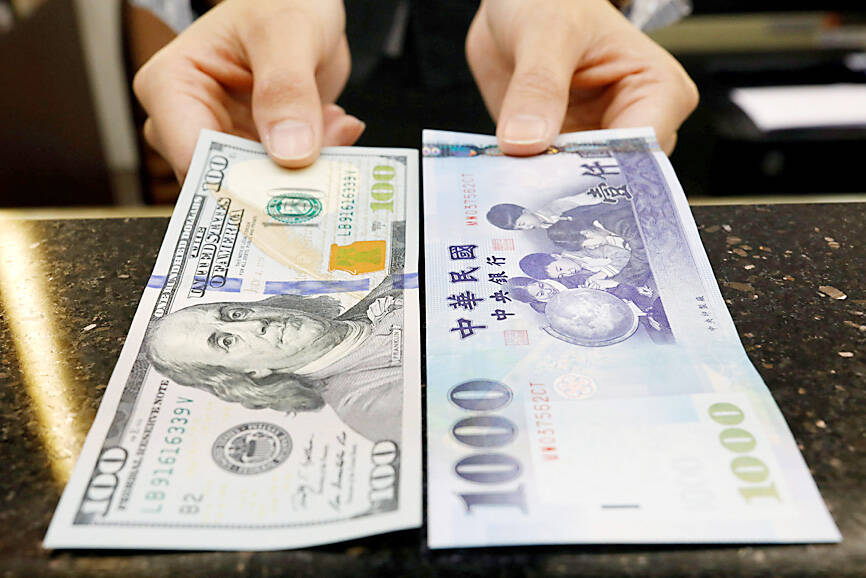Taiwan’s biggest life insurers yesterday posted profits for last month after the regulator rolled out new rules to allow companies to access extra reserves to offset shortfalls from gains in the local currency.
Cathay Life Insurance Co (國泰人壽) posted profits of NT$2.68 billion for last month, the company said in a statement, a steady increase from NT$440 million in May.
Nan Shan Life Insurance Co (南山人壽) reported profits of NT$11.28 billion, surging from NT$13 million the previous month.

Photo: Tyrone Siu, Reuters
Fubon Life Insurance Co (富邦人壽) said its profits reached NT$8.74 billion, compared with losses of NT$9.14 billion in May, while Taiwan Life Insurance Co (台灣人壽) and KGI Life Insurance Co (凱基人壽) also reported profits of NT$5.77 billion and NT$2.46 billion respectively, reversing previous losses.
Shin Kong Life Insurance Co (新光人壽) was expected to release its earnings later yesterday. The insurer posted losses of NT$15.38 billion in May.
The New Taiwan dollar spiked about 3.5 percent past NT$29 per US dollar last month before it slumped in a sudden move on the last day of the month. That erased some gains for the month and fueled speculation the central bank intervened.
There are still lingering concerns over a NT dollar appreciation after it cost the sector about US$9 billion in foreign exchange losses in the first five months of this year.
Fubon Life said it will allocate part of its liability reserves to its foreign exchange reserves to deal with increased currency swings, as did Cathay Life, which said the new rules will help the industry get “back to normal.”
“Net earnings impacts for 2025 are likely still negative if taking into account the additional contribution to FX reserves required under the new measures,” JPMorgan Chase & Co said in a note, adding that earnings and capital pressure largely eased last month for most life insurers.
Assets of Taiwan insurers reached NT$21.7 trillion by the end of May, with a hedging ratio at around 64 percent for those exposed to currency mismatch risk, the Financial Supervisory Commission said.
The NT dollar has stabilized at around the NT$29 level this month after the huge fluctuation from April to last month. However, the impact from potential US tariffs on Taiwan is still unclear while the negotiation is ongoing, and the risk for the local currency to appreciate again still remains.

IN THE AIR: While most companies said they were committed to North American operations, some added that production and costs would depend on the outcome of a US trade probe Leading local contract electronics makers Wistron Corp (緯創), Quanta Computer Inc (廣達), Inventec Corp (英業達) and Compal Electronics Inc (仁寶) are to maintain their North American expansion plans, despite Washington’s 20 percent tariff on Taiwanese goods. Wistron said it has long maintained a presence in the US, while distributing production across Taiwan, North America, Southeast Asia and Europe. The company is in talks with customers to align capacity with their site preferences, a company official told the Taipei Times by telephone on Friday. The company is still in talks with clients over who would bear the tariff costs, with the outcome pending further

NEGOTIATIONS: Semiconductors play an outsized role in Taiwan’s industrial and economic development and are a major driver of the Taiwan-US trade imbalance With US President Donald Trump threatening to impose tariffs on semiconductors, Taiwan is expected to face a significant challenge, as information and communications technology (ICT) products account for more than 70 percent of its exports to the US, Chung-Hua Institution for Economic Research (CIER, 中華經濟研究院) president Lien Hsien-ming (連賢明) said on Friday. Compared with other countries, semiconductors play a disproportionately large role in Taiwan’s industrial and economic development, Lien said. As the sixth-largest contributor to the US trade deficit, Taiwan recorded a US$73.9 billion trade surplus with the US last year — up from US$47.8 billion in 2023 — driven by strong

A proposed 100 percent tariff on chip imports announced by US President Donald Trump could shift more of Taiwan’s semiconductor production overseas, a Taiwan Institute of Economic Research (TIER) researcher said yesterday. Trump’s tariff policy will accelerate the global semiconductor industry’s pace to establish roots in the US, leading to higher supply chain costs and ultimately raising prices of consumer electronics and creating uncertainty for future market demand, Arisa Liu (劉佩真) at the institute’s Taiwan Industry Economics Database said in a telephone interview. Trump’s move signals his intention to "restore the glory of the US semiconductor industry," Liu noted, saying that

AI: Softbank’s stake increases in Nvidia and TSMC reflect Masayoshi Son’s effort to gain a foothold in key nodes of the AI value chain, from chip design to data infrastructure Softbank Group Corp is building up stakes in Nvidia Corp and Taiwan Semiconductor Manufacturing Co (TSMC, 台積電), the latest reflection of founder Masayoshi Son’s focus on the tools and hardware underpinning artificial intelligence (AI). The Japanese technology investor raised its stake in Nvidia to about US$3 billion by the end of March, up from US$1 billion in the prior quarter, regulatory filings showed. It bought about US$330 million worth of TSMC shares and US$170 million in Oracle Corp, they showed. Softbank’s signature Vision Fund has also monetized almost US$2 billion of public and private assets in the first half of this year,